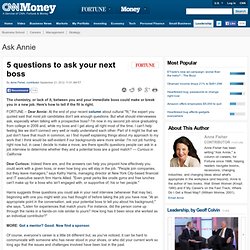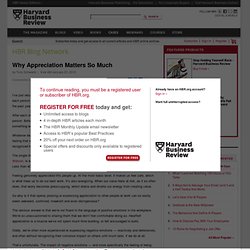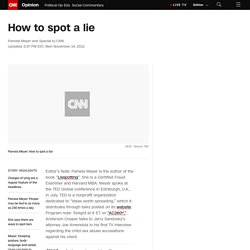

5 questions to ask your next boss - Ask Annie -Fortune Management. FORTUNE -- Dear Annie: At the end of your recent column about cultural "fit," the expert you quoted said that most job candidates don't ask enough questions.

But what should interviewees ask, especially when talking with a prospective boss? I'm now in my second job since graduating from college in 2006 and, while my boss and I get along all right most of the time, I can't help feeling like we don't connect very well or really understand each other. Part of it might be that we just don't have that much in common, so I find myself explaining things about my approach to my work that I think would be self-evident if our backgrounds were more similar.
Is your career switch actually worth the investment? - Oct. 28. Figure out if your career switch is worth the investment by calculating your ROI.

(MONEY Magazine) -- The key measurement in deciding where to put your money is the expected ROI, or "return on investment. " History and the current state of the economy allow you to make an informed guess about how different assets or classes of assets will perform in the future. Calculating ROI is straightforward enough: You take the final value of an investment, subtract what it cost you, and divide the result by your cost to arrive at the percentage yield. Buy a stock for $20 and sell it for $25 in a year, and your ROI is 25% (not counting trading costs). What about calculating the ROI on you? This is a question that applies not only to the factory worker who sees jobs headed overseas, but to anyone who thinks the decisions he or she made about the future while in high school or college are no longer valid. Best jobs for saving the world Figuring the payoff So is this transformation worth it? Watch for traps. Why Appreciation Matters So Much - Tony Schwartz.
By Tony Schwartz | 9:44 AM January 23, 2012 I’ve just returned from an offsite with our team at The Energy Project.

As we concluded, I asked each person to take a few moments to say what he or she felt most proud of accomplishing over the past year. After each of their brief recountings, I added some observations about what I appreciated in that person. Before long, others were chiming in. The positive energy was contagious, but it’s not something we can ever take for granted. Whatever else each of us derives from our work, there may be nothing more precious than the feeling that we truly matter — that we contribute unique value to the whole, and that we’re recognized for it. The single highest driver of engagement, according to a worldwide study conducted by Towers Watson, is whether or not workers feel their managers are genuinely interested in their wellbeing.
Why Some Startups Succeed And Others Fail: 10 Fascinating Harvard Findings. Final Cut: Words to Strike from Your Resume. How to spot a lie. Story highlights Charges of lying are a regular feature of the headlines Pamela Meyer: People may be lied to as many as 200 times a day She says there are ways to spot liars Meyer: Studying posture, body language and verbal clues can help to detect lying Editor’s Note: Pamela Meyer is the author of the book “Liespotting“.

A glance at recent headlines indicates just how serious and pervasive deceit and lying are in daily life. Republican presidential candidate Herman Cain is busy trading allegations of sexual harassment with several women; each side accuses the other of lying. Last week French president Nicolas Sarkozy was caught on an open microphone asserting to U.S.
Lying has destroyed careers and convulsed countries. Tales of cheating on school and college tests are rife. How much deceit do we encounter? Detecting lies, or “lie spotting,” is an essential skill for everyone to acquire, for both personal and professional reasons. Young bosses, older workers: Bridging the generation gap - Ask Annie. By Anne Fisher, contributor FORTUNE -- Dear Annie: A couple of months ago, my boss abruptly left the company, and I was promoted to his job as leader of a 16-person product-development team. This was somewhat surprising, since I am the youngest team member (I'm 27) and have been here for the shortest period of time (two and a half years). It's a great job and I'm delighted to have it, but several of my direct reports, who are twice my age or older, are not so thrilled.
I'm trying not to let their wisecracks about my age get to me, but I am having a hard time getting them to take me seriously as their boss. So far, we've managed to get the work done despite the friction, but it's tough. Dear N.B.: Scant comfort though it may be, you've got lots of company. "It's happening everywhere," says Jim Finkelstein, president and CEO of a consulting firm called FutureSense, based in San Rafael, Calif., and author of a new book, Fuse: Making Sense of the New Cogenerational Workplace. 1. 2. 3.
Promotions. General Articles. Salary. Interviewing. Networking. General.